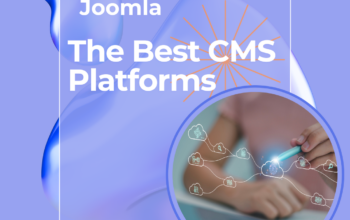Introduction
Joomla is widely recognized as one of the best content management systems for website building. It has been a preferred choice for developers, businesses, and individuals looking to create dynamic, scalable, and feature-rich websites. Launched in 2005 as a fork of Mambo, Joomla has grown into a versatile CMS with a strong community and robust features, making it an excellent platform for web development.
What is Joomla?
Joomla is an open-source CMS written in PHP that uses MySQL or PostgreSQL as its database. It provides users an intuitive interface for managing content, making it an ideal solution for building websites, online applications, and intranet portals. Joomla’s flexibility, extensibility, and ease of use make it a top choice for beginners and advanced developers.
Why Joomla is Among the Best CMS for Website Building
1. User-Friendly Interface
Joomla offers an intuitive and easy-to-navigate interface that simplifies content management. Users with limited technical knowledge can manage their websites effectively, making it a great choice for businesses and individuals.
2. Extensibility and Customization
Joomla provides a vast library of extensions, including plugins, modules, and components, allowing users to enhance their website’s functionality without extensive coding. Additionally, its customizable templates provide flexibility in design and branding.
3. Built-In SEO Features
As one of the best content management systems, Joomla includes SEO-friendly URL structures, metadata management, and built-in SEO tools that help websites rank higher in search engine results.
4. Robust Security
Joomla has a dedicated security team that actively monitors and patches vulnerabilities. Features like two-factor authentication, extensive access control levels, and frequent security updates ensure a secure website environment.
5. Multilingual Support
Joomla is one of the few CMS platforms that offer built-in multilingual support, making it an excellent choice for businesses targeting international audiences.
6. Scalability and Performance Optimization
Joomla supports websites of all sizes, from small business sites to large enterprise solutions. Its caching mechanisms, optimized performance settings, and third-party integrations make it a powerful choice for high-traffic websites.
7. Strong Community and Support
With a large and active global community, Joomla users have access to extensive documentation, forums, and expert support. This ongoing collaboration helps ensure the CMS remains up-to-date and continues evolving with modern web trends.
8. E-commerce and Business Capabilities
It supports e-commerce functionality through extensions like VirtueMart, making it an ideal platform for online stores and business websites.
Joomla vs. Other Best Content Management Systems
Joomla competes with other leading CMS platforms like WordPress and Drupal. Below is a comparison highlighting Joomla’s strengths:
1. Joomla vs. WordPress
- Ease of Use: WordPress is easier for beginners, but Joomla provides more flexibility for advanced users.
- Customization: Joomla has a better structure for complex websites, whereas WordPress relies heavily on plugins.
- Security: Joomla offers more built-in security features, while WordPress requires additional plugins.
- SEO: Both are SEO-friendly, but Joomla has better out-of-the-box SEO features.
2. Joomla vs. Drupal
- Ease of Use: Joomla is easier to use compared to Drupal, which requires more technical expertise.
- Scalability: Both Joomla and Drupal are scalable, but Joomla offers a balance between power and ease of use.
- Security: Drupal is known for its high-security standards, but Joomla also provides strong security features.
- Customization: Joomla provides a flexible framework with extensive customization options, whereas Drupal is highly customizable but complex.
Use Cases of Joomla
Joomla is versatile and can be used for various types of websites, including:
- Business Websites: Companies use Joomla to create professional and scalable websites.
- E-commerce Sites: With extensions like VirtueMart, Joomla supports e-commerce functionality.
- Educational Websites: Joomla is used by schools and universities for content management.
- Government Portals: Many government agencies prefer Joomla due to its security and multilingual support.
- Non-Profit Websites: NGOs and charities use Joomla for donation management and community engagement.
- Community and Membership Websites: Joomla is ideal for building forums, social networks, and membership sites due to its powerful user management features.
- Media and Publishing Sites: News websites and magazines benefit from Joomla’s content organization capabilities.
Advantages of Joomla for Website Building
- Flexible Content Management: Joomla offers advanced article management, categorization, and tagging features.
- Powerful User Management: With detailed permission settings, Joomla is ideal for multi-user websites.
- Third-Party Integrations: Joomla supports integration with CRMs, ERPs, and various business applications.
- Performance Optimization: Built-in caching and performance-enhancing plugins improve website speed.
- Accessibility Compliance: Joomla ensures websites are accessible to users with disabilities.
- Advanced Media Management: Users can manage images, videos, and documents efficiently.
- Regular Updates: The Joomla community consistently updates the platform with new features and security patches.
Challenges of Using Joomla
While Joomla is one of the best content management systems, it does have some challenges:
- Steeper Learning Curve: Joomla requires more technical knowledge than WordPress.
- Fewer Themes and Plugins: Compared to WordPress, Joomla has fewer themes and extensions available.
- Complex Configuration: Advanced customization may require development skills.
Future of Joomla in Content Management
Joomla continues to evolve with modern web trends. Upcoming versions focus on:
- Improved UI/UX for easier content management.
- Enhanced SEO features.
- More integrations with modern web technologies.
- Continued security enhancements.
Conclusion
Joomla remains one of the best content management systems for website building due to its flexibility, robust security, extensibility, and strong community support. Whether you are creating a blog, corporate website, or e-commerce store, Joomla provides the necessary tools to build a feature-rich and user-friendly website. Its ability to balance ease of use with advanced functionality makes it an excellent choice for businesses, developers, and content creators looking for a powerful and scalable CMS.





